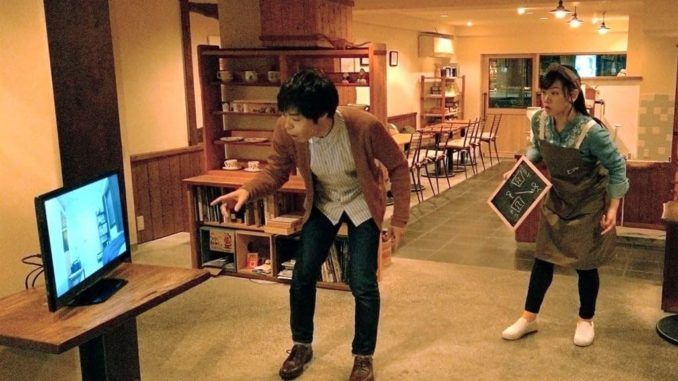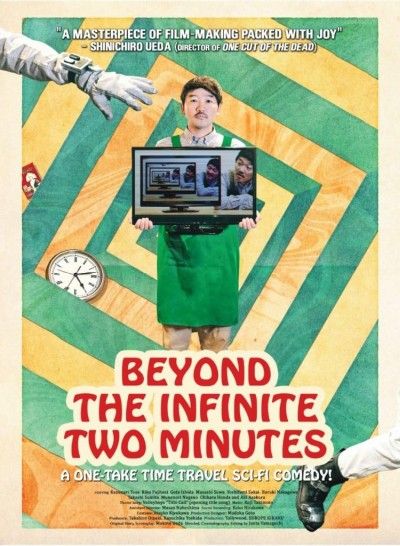
Rating: A-
Dir: Junta Yamaguchi
Star: Kazunari Tosa, Riko Fujitani, Gôta Ishida, Masashi Suwa
In terms of genres, this may cross off more boxes than any other film this year. It’s mostly science fiction, while it is funny enough to qualify as a comedy too. Yet it’s also a thriller, and there’s a romantic element which is key to proceedings as well. Given the minute budget, it’s an amazing technical feat of scripting, production and editing, designed to look like a seamless one-shot (it’s really several, each about ten minutes). But it never forgets that in cinema, everything starts and ends with the characters. You care about the ones here, and what happens to them, as they try to handle a set of circumstances best described as unique, unfolding in real time over little more than an hour.
Kato (Tosa) lives in an apartment above the cafe he owns, though his real ambition is to become a musician. One evening, he suddenly sees himself appearing on his own TV screen, from the monitor in the cafe below, trying to attract his own attention. Courtesy of a wormhole, a portal in space-time has opened, showing him what’s happening below, two minutes into the future. He obeys his own instructions, rushing downstairs to become the other side of the unexpected conversation. Naturally, waitress Aya (Fujitani) is confused, until Kato explains the scenario. Other friends show up, and seek ways to profit from the wormhole, also finding a way the two minutes can be stretched further, by pointing the screens at each other.
 Things naturally go awry, although it’s best not to know exactly how. I will say, the romance kicks in when Future Kato tells Present Kato to ask out a neighbour on whom he has a crush, saying she accepts. Except… she didn’t, Future Kato only saying that to avoid a paradox. It’s a beautiful example of how the film handles the issues “time travel” raises. It adopts a similar approach to One Cut of the Dead, in that you see events twice, the second time from a totally different perspective. Except, here, it happens every two minutes, a startling and ambitious feat, its execution likely helped by the strong theatre background of cast and director.
Things naturally go awry, although it’s best not to know exactly how. I will say, the romance kicks in when Future Kato tells Present Kato to ask out a neighbour on whom he has a crush, saying she accepts. Except… she didn’t, Future Kato only saying that to avoid a paradox. It’s a beautiful example of how the film handles the issues “time travel” raises. It adopts a similar approach to One Cut of the Dead, in that you see events twice, the second time from a totally different perspective. Except, here, it happens every two minutes, a startling and ambitious feat, its execution likely helped by the strong theatre background of cast and director.
It is marginally contrived in some ways. I must say, Japanese monitors have really long power cords. I can’t rearrange my desk before something has to be unplugged. Kato can relocate from his bedroom, down two flights of stairs and into the cafe, without so much as an extension cord. But this is engrossing enough to pull me past such trivial concerns, towards a finale where everything, everywhere, all at once, comes together beautifully. This might not quite replace Run Lola Run as my favourite in the time genre. Tosa’s performance is more laid back than I feel the bizarre circumstances demand, and I prefer the force of nature that is Franka Potente (plus, that soundtrack!). However, I’m hard pushed to think of any other to beat it.
